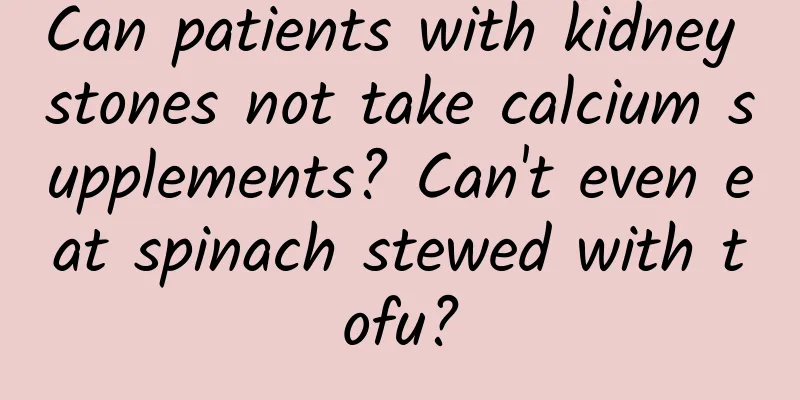Can patients with kidney stones not take calcium supplements? Can't even eat spinach stewed with tofu?

|
When it comes to calcium, many people may think that calcium supplementation makes bones and teeth harder. Some people associate calcium supplementation with kidney stones. In clinic, many patients think that kidney stones are closely related to calcium. Many of them ask if they cannot eat tofu, drink milk, or take calcium supplements if they have kidney stones. So, does calcium supplementation really cause kidney stones or make them worse? Today, let's take a look at the myths and misconceptions about kidney stones and calcium. Myth 1 Rumor: Elderly people who take calcium supplements may develop kidney stones. Analysis: This statement is inaccurate. The formation of kidney stones is as follows: when we eat delicious food, in addition to the nutrients needed by the human body, it also produces substances such as oxalate and urate. When these substances are absorbed into the blood and excreted through the kidneys, the kidneys will throw them into the urine like garbage. Under normal circumstances, these things will "roll" out of the human body along with the urine. But when we forget to drink water or continue to work in a high temperature environment, it will lead to concentrated urine and less urine. If these substances in the body stay in the urine for a long enough time, they will grow larger and larger, and finally gradually become stones. Therefore, it cannot be simply said that normal calcium supplementation in the elderly will cause kidney stones, and the same is true for young people. Map: Wu Juan, head nurse of Urology Department, Shanghai Ninth People's Hospital, School of Medicine, Shanghai Jiao Tong University Myth 2 Rumor: If you have kidney stones, you cannot take calcium supplements. Analysis: This statement is inaccurate. There is no significant difference between calcium supplementation for kidney stone patients and normal people. For some kidney stone patients with osteoporosis or fractures who need calcium supplementation, it is recommended that they can take calcium supplements in moderation through diet or calcium supplements. The kidney is a common site for stones. Many patients who have experienced kidney stones shudder when talking about them. The pain is like "a knife twisting the kidneys". Even strong men can be tortured to the ground. Because the attack is particularly painful and kidney stones are prone to recurrence, many patients pay special attention to their diet. Old patients often come back for a consultation and say, "I don't know what happened. Since I discovered the stones, I've been paying special attention to my diet. I don't take calcium tablets, drink milk, or eat spinach, but I still have kidney stones." There are many patients like this in clinical practice. Most of them believe that stones contain a lot of calcium carbonate, and calcium supplementation will aggravate kidney stones. So, will calcium supplementation aggravate the condition of patients with kidney stones? The answer is no . Studies have shown that 75% of kidney stones are caused by calcium oxalate. When oxalic acid and calcium meet, they form insoluble calcium oxalate. The combination of oxalic acid and calcium in urine is the main cause of kidney stones. For the prevention of kidney stones, it is indeed important to reduce oxalic acid and calcium in urine. However, these two substances are not as simple as "eating more will cause kidney stones, and eating less will not cause kidney stones". The kidneys play a key role in calcium excretion. Under normal circumstances, about 20% of calcium is excreted through the kidneys, while the remaining 80% is excreted through feces. In general, the oxalate we eat will combine with the calcium we eat. When oxalic acid and calcium are excreted together through the kidneys, they form water-insoluble calcium oxalate. Normally, these tiny calcium oxalate particles can be excreted smoothly, but excessive oxalic acid can cause excessive calcium oxalate load to form, thereby blocking the narrow kidney channel, which in turn affects the subsequent excretion of calcium oxalate, causing calcium oxalate to continue to deposit and form stones and "grow bigger and bigger". Later, it will fall off to the ureter and cause obstruction, thereby inducing renal colic. It can be seen that a low-calcium diet will cause excess oxalate to enter the blood, which is more likely to cause urinary stones. Moreover, there is no definite evidence to date that calcium supplementation is likely to cause kidney stones. First, calcium can react with oxalic acid, reducing the body's absorption of oxalic acid and reducing the risk of calcium oxalate stones; second, a proper high-calcium diet can reduce the release of calcium from bones, thereby reducing the calcium level in the blood and reducing the risk of stones. Therefore, patients with kidney stones should also take calcium supplements according to the doctor's advice. While strengthening dietary supplements, they should also pay attention to drinking more water, which can increase urine volume and dilute urine. In addition, they should do more outdoor activities and go out to bask in the sun more often, because sunlight can promote the body's own synthesis of vitamin D and help the body absorb calcium. Map: Wu Juan, head nurse of Urology Department, Shanghai Ninth People's Hospital, School of Medicine, Shanghai Jiao Tong University Myth 3 Rumor content: After suffering from kidney stones, you cannot eat spinach stewed with tofu, tofu with green onions, or even tofu or soy products? Analysis: Not really. Multiple studies have proven that the above foods do not increase the risk of kidney stones. Less urinary calcium means less risk of kidney stones. Potassium and magnesium in vegetables can help reduce urinary calcium loss. Therefore, if there is really a lot of oxalic acid in the food, it is better to eat it with high-calcium foods, such as spinach stewed with tofu, leek fried tofu, scallion mixed with tofu, etc. This can actually reduce the absorption of oxalic acid. Because high-oxalic acid foods and high-calcium foods form calcium oxalate in the intestines, and the formed calcium oxalate will be directly excreted from the feces in the intestines. Tofu alone will not cause kidney stones. In addition, tofu can prevent kidney stones. The oxalic acid content in tofu is very low, especially in brine tofu and gypsum tofu, which is the most common and main cause of kidney stones. The low oxalic acid content in tofu may be because some of the oxalic acid is dissolved into the water and washed away during the soaking process of soybeans, or because after the tofu is coagulated, it will be squeezed or left naturally to remove some water, and the oxalic acid will be removed with the water. Foods further processed from tofu (such as dried tofu) will not have high oxalic acid content either. Therefore, even people with a higher risk of stones can eat tofu in moderation, and healthy people do not need to worry about stones caused by eating tofu or soy products. Planning and production Author: Xi Qinghong, Head Nurse of Urology Department, Shanghai Ninth People's Hospital, School of Medicine, Shanghai Jiao Tong University Reviewer: Professor Zhang Yaqing, Editorial Director of the Journal of Shanghai Jiao Tong University School of Medicine, Director of the Institute of Nursing Management, China Hospital Development Institute, Shanghai Jiao Tong University |
Recommend
Chickenpox, which is spread through face-to-face contact, is more contagious than monkeypox? Don’t be afraid, let’s fight acne together!
Monkeypox virus has sparked heated discussions, b...
To prevent bleeding, redness, swelling and atrophy of gums, is it enough to add amino acids to toothpaste?
"Toothache is not a disease, but it is reall...
The inedible "tree lobster" survives on an isolated island
Lord Howe Island is a volcanic island located bet...
Practical examples: one article explains user growth in detail! !
The concept of User Growth (UG) originated from t...
Siberian tigers are on the scene! The "king of the jungle" is not just a saying
Review expert: Wang Lei, National Park and Nature...
Price inquiry for the production of Quzhou Mall Mini Program. How much does it cost to produce Quzhou Mall Mini Program?
How much does it cost to produce the Quzhou Mall ...
From the laboratory to commercialization, is the era of humanoid robots really coming?
Recently, there has been a lot of discussion abou...
Yang Yuanqing: Apple's market share in the United States has peaked, and there are great opportunities in emerging markets
Beijing time, January 28, global PC and smartphon...
How to promote offline activities?
In a year, it is always necessary to plan and exe...
The Earth "remembers" each of our names
From the perspective of the universe, the earth r...
BMW CFO talks about Apple cars: Not afraid of threats, "sleep soundly", and will continue to maintain its leading position in the industry
According to foreign media reports, BMW Chief Fin...
How to name a brand, here are 6 tips!
Written at the beginning: The success of big bran...
2017 Big Data Festival is coming in October, iResearch A10 Summit will open on the 27th
As a major event in the field of big data in Chin...
What to do if you encounter user loss during APP operation
No matter how great a product is, there will be p...









